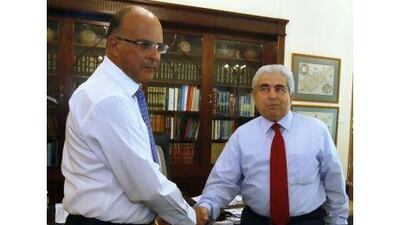NICOSIA // The Cypriot cabinet resigned yesterday to try to damp down public fury over a fatal munitions blast that destroyed the island's largest power plant and compounded its economic woes, possibly forcing an EU bailout.
The government spokesman, Stefanos Stefanou, said it would not necessarily need the help, but even before the energy crisis caused by the July 11 blast, borrowing costs had risen steadily because of Cyprus's exposure to Greek debt.
"Don't take it as a given that Cyprus will be admitted into a support mechanism," Mr Stefanou said.
Thousands of Cypriots have demonstrated over the blast, blaming state incompetence for allowing the seized munitions to be stored near the power station in scorching heat.
Demetris Christofias, the president who was elected for a five-year term in 2008, who is facing probably the biggest challenge of his political career, has also been under pressure from coalition partners DIKO to create a broad-based unity government to tackle the crisis.
When he did not immediately heed the call last week, DIKO on Wednesday asked its two ministers to resign. Mr Christofias responded by asking all of the ministers to quit.
"The president of the republic briefed ministers of his intention to proceed with a broad reshuffle of the government and asked they place their resignations at his disposal," Mr Stefanou said.
Cyprus has been left shell-shocked by the explosion and the prolonged political wrangling threatens to derail needed economic reforms.
Preliminary finance ministry estimates suggest the blast will wipe out growth this year to zero and Moody's on Wednesday cut Cyprus to three notches above junk.
Last week, the island's central bank governor and European central bank governing council member, Athanasios Orphanides, warned that without immediate action Cyprus might follow Greece, Ireland and Portugal in asking for an EU handout.
The cost of damage from the explosion and subsequent disruption from rolling power cuts has been cited as anything between €1-3 billion (Dh5.24-Dh15.75bn). The finance ministry has not given an assessment, but €3 bn would represent 17 per cent of Cyprus's GDP.
The munitions, confiscated from a ship sailing from Iran to Syria in 2009, were stored a few hundred metres away from a power station on the south coast in often scorching conditions, despite appeals from army officers.
Mr Christofias has said an inquiry into the incident will also scrutinise his own rule, but aides said he was unaware of the storage conditions.

